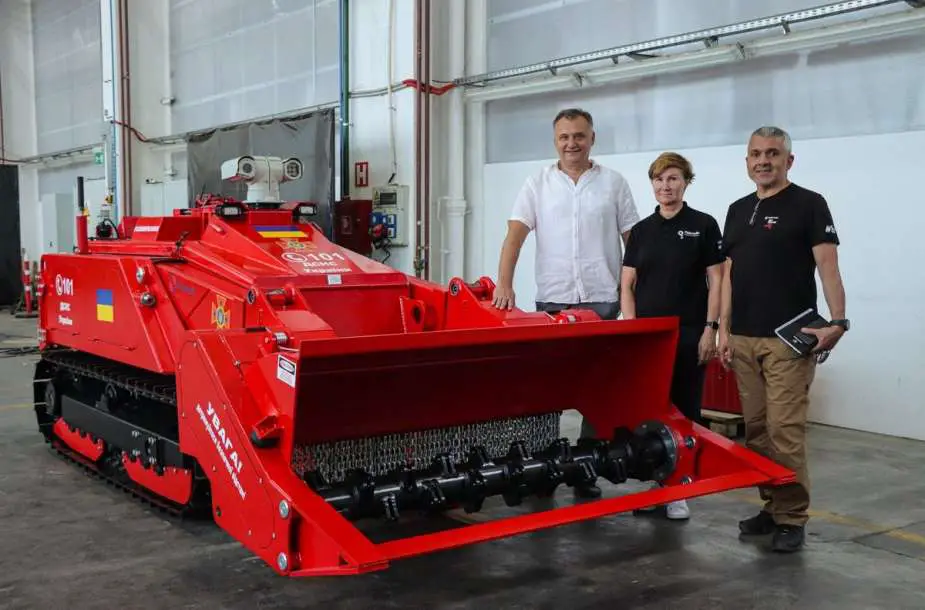- Army
- Conflicts in the world
- Israel - Iran conflict 2025
- Pakistan - India Conflict 2025
- Russia Ukraine War 2022
- Libya conflict day by day
- HAMAS - Israel War 2023
- Operation Serval in Mali French Army
- Sangaris operation Central African Republic
- Sangaris opération militaire République Centreafrique
- Ukraine - Russia conflict
- Syria conflict news
- Defence & Security Industry Technology
- Armies in the world
- Analysis Defense and Security Industry
- Conflicts in the world
- Navy
- Air
Estonia counters Russian anti-tank mines in Ukraine with Dok-Ing MV-4 Scorpion
Following Switzerland's recent contribution, Estonia has now stepped up to aid Ukraine's demining efforts. The Estonian Association of Rescuers, Päästeliit, has purchased a Dok-Ing MV-4 demining machine worth over a million euros for Ukraine's State Emergency Service. Named "Yaroslava" in honor of Ukrainian high-jump world champion Yaroslava Mahuchykh, the machine is set to be delivered to Ukrainian rescue teams in the coming days. The Estonian Embassy in Ukraine confirmed the upcoming delivery. Funding for this significant purchase was provided by Estonian businessmen Kristjan Rahu, Priit Koit, and Valdur Laid, the heads of UG Investments.
Follow Army Recognition on Google News at this link

Dok-Ink MV-4 robotic demining system is outfitted with a rotary grapple, a demining claw, and a bulldozer blade (Picture source: LaidValdur Twitter)
The Dok-Ink MV-4 robotic demining system is outfitted with a rotary grapple, a demining claw, and a bulldozer blade. Engineered to withstand the detonation of anti-personnel mines and unexploded ordnance, the machine is also resilient against anti-tank mine blasts. It can clear land mines up to 170 cm wide.
In recent months, humanitarian aid aimed at helping Ukrainian civilians combat the minefields left in villages and fields after the withdrawal of Russian troops has been on the rise. This is evidenced by donations of remote-controlled demining machines from several countries, including a recent contribution from Switzerland, as reported by Army Recognition on August 30, 2023.
For example, Ukraine already operates 10 mine removal robots manufactured by DOK-ING, a Romanian company specializing in demining. These robots have surveyed over a million square meters of land and neutralized more than 700 different explosive objects. The urgency for mine clearance in Ukraine stems from the Russian invasion in February 2022. A report by Globesec dated April 26, 2023, reveals that nearly 30% of Ukraine's territory, approximately 174,000 km², is contaminated with mines and unexploded ordnance. As of June 2023, efforts have led to the clearance of around 540,000 unexploded items. However, the World Bank estimates the total cost of securing Ukraine to be an astounding $37 billion.
The demand for such advanced mine clearance technology is undeniable, as Ukraine currently relies on a limited fleet of 20 mine clearance machines, with a mere three deployed in the Kharkiv Region. Additionally, the country is grappling with a shortage of approximately 3,000 skilled mine clearance specialists, underscoring the urgent need for innovative solutions.
Ukraine's Minister of Economy, Yulia Svyrydenko, has announced that the country is slated to receive $244 million in funding for humanitarian demining initiatives. This financial support will be sourced from a diverse group of international donors, including the United States, the European Union, Japan, Germany, the United Kingdom, Norway, Sweden, Italy, Lithuania, the Netherlands, Denmark, Canada, Austria, Switzerland, South Korea, and the Howard Buffett Foundation.
In addition to foreign aid, Minister Svyrydenko revealed on Twitter on August 2, 2023, that a Kharkiv-based company has successfully developed and certified a specialized vehicle designed for soil preparation in humanitarian mine clearance operations, as Army Recognition reported on August 4, 2023. This new demining system aims to streamline the process of removing explosive devices and safely clearing fields intended for cereal crop cultivation.
Further emphasizing Ukraine's broader goal of self-sufficiency in defense technology production, the country has signed memoranda with Croatian corporation DOK-ING and Danish company Hydrema. These agreements aim to establish two new factories in Ukraine that will focus on the production of military-grade armored demining vehicles for civilian areas and frontline deployment.


























